Today, virtual assistants (VAs) have emerged as powerful AI-driven tools with diverse applications across various industries. With their ability to interact and engage with users through conversational interfaces, chatbots are revolutionizing the way businesses and organizations connect with their audiences. From streamlining customer support to optimizing sales processes, digital tools have become vital assets in delivering efficient and personalized help.
In this exploration of chatbot use cases, we will uncover the main applications of digital tools, what you can expect from them, and the remarkable impact they have on raising experiences and achieving tangible results for companies. Whether it’s providing real-time assistance, automating repetitive tasks, or offering unique recommendations, bots continue to redefine the future of engagement and service delivery.

Based on Gartner’s research, there is a projected 40% increase in the adoption of technology, with 38% of organizations planning to implement bots within the next two years. Join Master of Code Global on this journey to discover the boundless potential of such assistants and how they are reshaping the way we interact with technology and information.
Table of Contents
What Can a Chatbot Be Used For?
Virtual assistants are computer programs designed to interact with users through conversational interfaces. They are versatile tools applicable to various industries and business functions, such as sales, marketing, and internal process automation. These numerous use cases for bots have contributed to their widespread adoption.
Customer service chatbot use cases include handling routine inquiries, offering instant responses, and freeing up human agents for more complex tasks. Additionally, bots are used in eCommerce to assist people with product recommendations and order tracking. In healthcare, they can offer preliminary medical advice and schedule appointments. Moreover, AI tools are employed in education for personalized tutoring and language learning. Their versatility and 24/7 availability make bots valuable tools for automating tasks, boosting experiences, and increasing operational efficiency.
Based on TIDIO’s projections, the use of conversational solutions is expected to drive substantial growth in the market, with an estimated increase of over $994 million, indicating an annual gain of approximately $200 million. The current compound annual growth rate (CAGR) of approximately 22% suggests that this figure could potentially reach $3 billion by the end of the current decade.
If you’re considering the use of AI tools for your company, take the time to explore their diverse applications across most popular sectors and business processes to identify the most fitting solution for your specific needs.
Functional Applications of Virtual Assistants
Client Help Chatbot Use Cases
In response to expectations for quick and personalized assistance to reimagine buying journeys, VAs become a valuable resource, effectively meeting these demands. The use of chatbots in customer service is instrumental, as many companies today see this area as the most important one for their business.
Imagine Emma browsing an online store late at night, unsure about sizing and delivery timelines for a dress she wants. A virtual assistant instantly answers her questions, recommends the right size, and confirms expedited shipping, giving her the confidence to complete her purchase. By offering quick, personalized assistance, chatbots help businesses meet client demands even outside regular hours. Let’s take a look at the most popular chatbot use cases for customer service.
- 24/7 Support. Virtual agents are capable of offering continuous assistance, efficiently handling queries and issues at any hour of the day or night. For example, Master of Code Global developed a Jewelry Retail bot that provides 24/7 support, answering questions about luxury products, orders, and store locations, demonstrating the effectiveness of AI in providing round-the-clock service across different time zones.
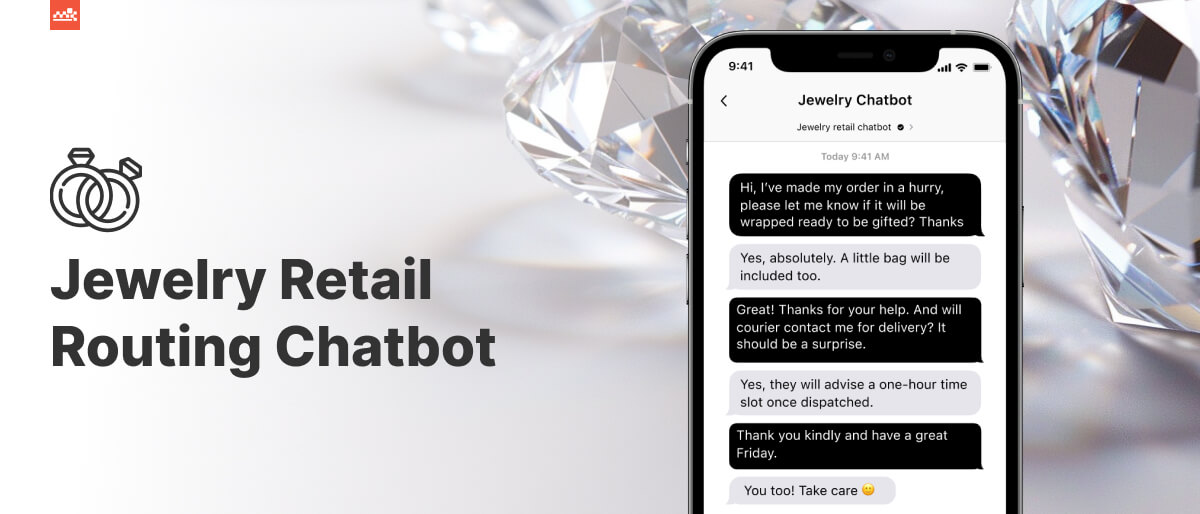
- FAQs. Intelligent assistants are designed to deliver instant responses to common inquiries, effectively reducing the workload on support agents. The World Surf League FAQ chatbot, built by Master of Code Global, efficiently answers common fan questions about athletes, schedules, and events, allowing human employees to focus on more specialized requests.
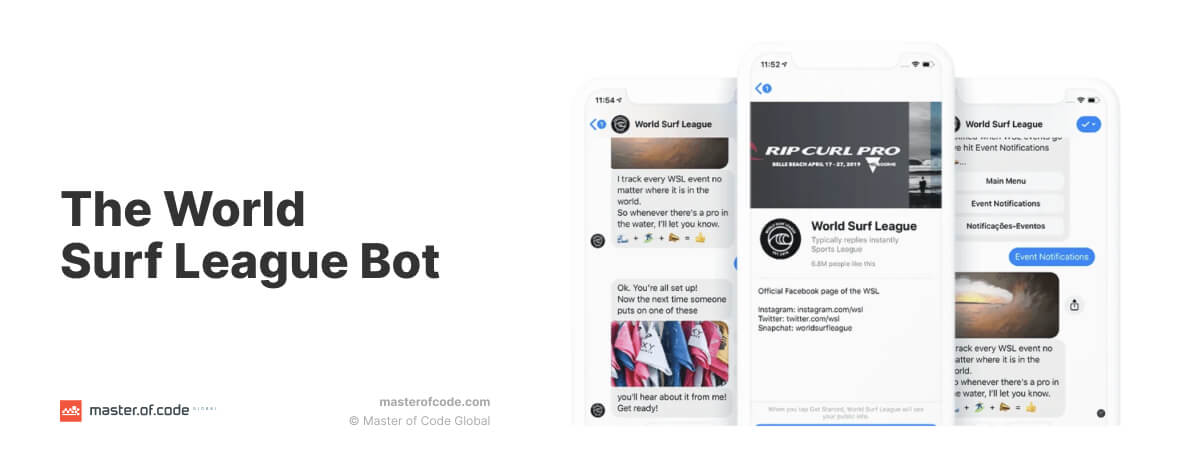
- Feedback Collection. The use of bots for business plays a crucial role in gathering reactions and opinions, supplying valuable insights that enable better understanding of people’s needs and facilitate improvements to the services.
- Language Support. The multilingual capabilities of chatbots enable companies to overcome barriers, ensuring engagement with people from diverse linguistic backgrounds and delivering an inclusive customer experience. Moreover, this feature expands reach to global markets, strengthening connections and facilitating seamless interactions across language divides.
- AI Voice Assistants. These bots can handle automated calls, guiding users through menu options and routing them to the appropriate department or resolving simple queries. Master of Code Global’s Embeddable Voice Assistant framework enables us to integrate voice-activated capabilities into clients’ apps, further improving interactions through personalization.
- Call Center Automation. Agents can mechanize various help desk tasks, such as answering frequently asked questions, routing calls to appropriate managers, and providing self-help options. This frees up your staff to handle more complex issues and improves overall call center efficiency.
Marketing Chatbot Use Cases
AI tools offer various applications to elevate marketing efforts and boost client engagement. From lead generation and tailored recommendations to feedback collection and interactive campaigns, marketing chatbots play a crucial role in optimizing strategies and providing a seamless experience for people.
- Lead Generation. This is one of the most popular and effective chatbot use cases for brand promotion. VAs can qualify potential leads in interactive conversations, ask relevant questions to qualify potential leads, and capture their contact information. For example, Master of Code Global developed a VIP onboarding chatbot for an entertainment company that streamlined the onboarding process for their VIP community and acquired leads through engaging communication, including motivational content and AR effects. This resulted in 48,679 people subscribed to broadcasting with 3,400 active users weekly.
- Interactive Campaigns. Use of chatbot plays an important role in encompassing quizzes, surveys, contests, and more. By interacting with users, tools gather valuable insights, including preferences, opinions, and feedback. This data is then leveraged to tailor targeted marketing strategies, improve product offerings, and refine engagement approaches. Master of Code Global, in partnership with Infobip, developed a Generative AI bot for BloomsyBox that created unique personalized greeting cards for contest winners, demonstrating the potential of assistants to deliver highly engaging and unique journeys during peak shopping seasons.
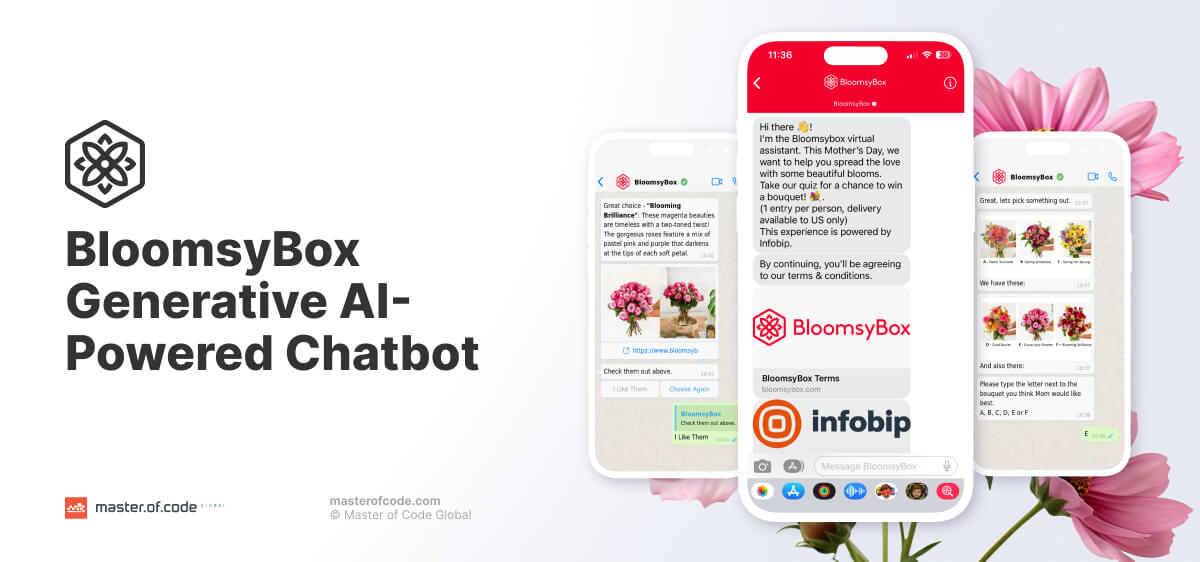
- Event Promotion. Marketers can use bots to engage with potential attendees, equipping them with comprehensive details, including date, time, location, agenda, and special guest information. Our team developed an eCommerce and storytelling chatbot for Burberry that allows their audience to communicate with the brand in a unique way, including watching live streams of fashion shows and receiving personalized product suggestions.

- New Product Introduction. When companies launch a new offering, their conversational tool can be programmed to attract users’ attention through in-chat interactions. This is possible to implement by providing people with essential details and benefits of the newly launched product or service. Exactly for such needs, we created the Giuseppe Virtual Assistant for Dr. Oetker to promote their Easy Pizzi product and drive engagement for a sweepstakes contest.
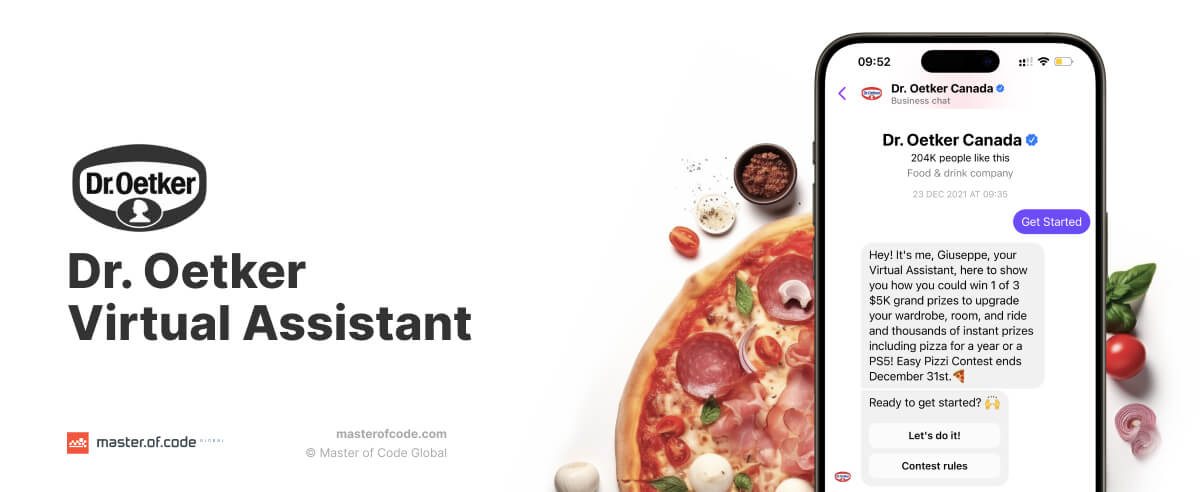
HR Chatbot Use Cases
The applications for VAs include assisting with benefits enrollment, answering frequently asked questions, guiding employees through onboarding, and conducting exit interviews. With individualized support and quick access to critical information, HR chatbots use AI and natural language processing (NLP) to automate routine tasks, improve efficiency, and foster stronger employee engagement. Now, we will explore the valuable chatbot use cases in optimizing HR operations and delivering a seamless employee journey.
- HR Assistants. Companies can use them to provide instant responses and accurate information on topics such as leave policies, working hours, payroll details, benefits, company policies, and more.
- Knowledge Automation. HR bots can serve as a central hub, equipping anyone from the staff with instant access to company policies, procedures, and other important databases. This guarantees consistency in information sharing and reduces the time specialists spend searching for answers. For instance, our custom-made Generative AI Slack chatbot allows employees to easily find answers to HR and technical questions, promoting efficient knowledge sharing and collaboration within the company.
- Benefits Enrollment. Digital assistants provide clear and concise explanations of complex advantages packages, including health insurance plans, retirement options, and other perks, confirming that employees fully understand the implications of their choices. In case they have specific questions or concerns, chatbots can address them promptly, avoiding the need to wait for HR personnel to respond.
- Training and Development. AI tools recommend instruction courses and growth opportunities based on employees’ roles, skills, and career goals, promoting continuous learning within the organization.
- Payroll Inquiries. Customers can use chatbots to check monetary details, including salary, deductions, and payment dates, without the need to contact HR directly. This not only saves time but also ensures employees have quick and reliable access to critical information whenever they need it.
- Coaching and Mentoring. HR teams can deploy an AI coaching app to deliver tailored, on-demand mentoring to employees, empowering them to better their hard and soft skills, tackle challenges, and achieve their professional goals with greater efficiency. Master of Code Global developed a chatbot for a Biotechnology company to empower their in-house customer support teams, allowing them to quickly get help from supervisors and this way provide quality assistance to direct customers.
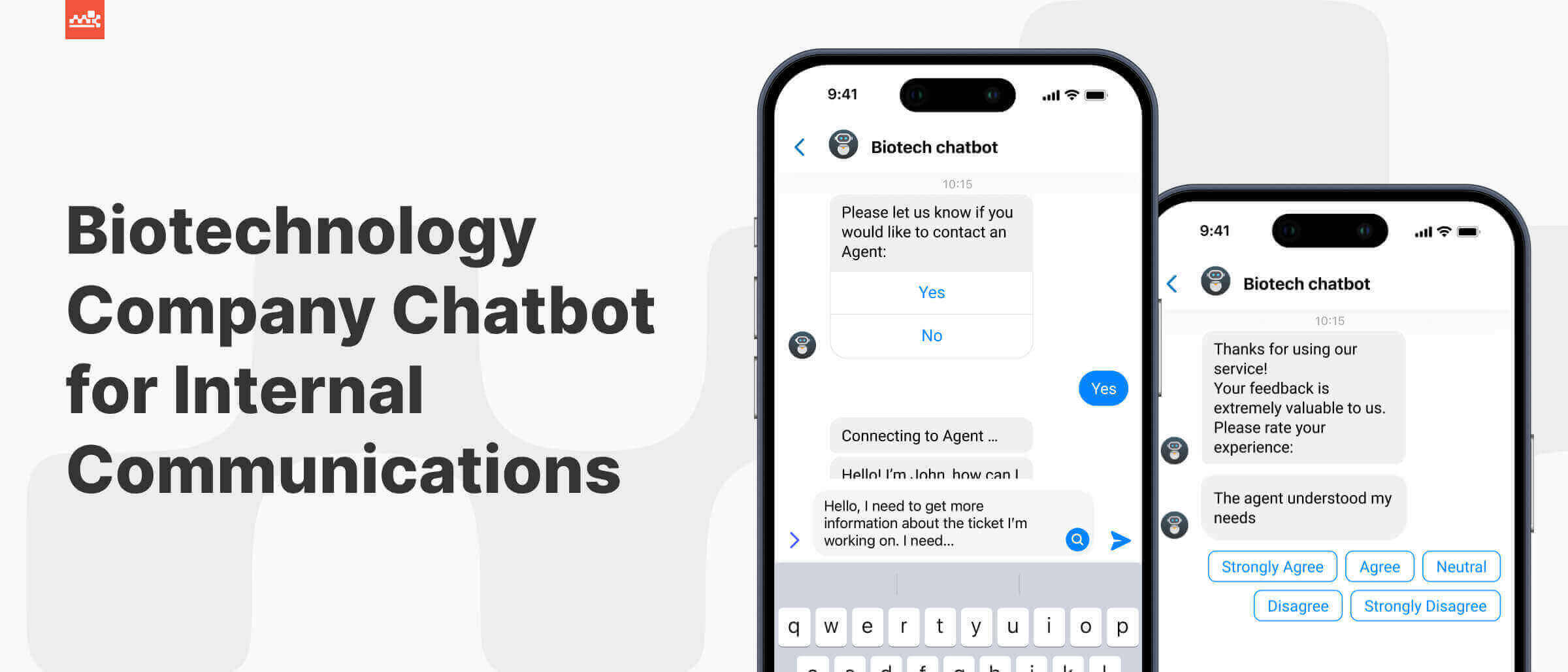
Sales Chatbot Use Cases
The applications of virtual assistants are multifaceted, including engaging with potential customers, qualifying leads, offering product recommendations, giving real-time order updates, recovering abandoned carts, and acting as personalized assistants, among other functions. By utilizing artificial intelligence and natural language processing, sales chatbots streamline interactions, boost sales productivity, and deliver a more seamless and unique shopping experience.
Personalization also plays a critical role in retention, as 77% of business leaders agree that providing unique support significantly improves user retention rates. Sales bots excel in this area by offering targeted recommendations and timely support, making them valuable assets in optimizing sales strategies and achieving higher satisfaction and conversion rates.
- Product Recommendations. AI uses data and past interactions to perform sophisticated analyses of preferences and behavior. By using this information, bots can offer highly tailored product recommendations to individuals. For example, we created a chatbot for La Mer that acts as a digital skincare concierge, engaging buyers with recommendations based on their individual needs and preferences, ultimately driving sales.
- Tracking and Status Updates. Digital tools excel at delivering real-time revisions on the order status, shipping details, and estimated delivery timelines. By offering this information promptly and accurately, bots significantly improve satisfaction by keeping people informed about the progress of their orders. The Broadcast Tool that we developed for an entertainment company enables them to send targeted updates and notifications to their audience, demonstrating the potential of bots to keep users informed and engaged.
- Abandoned Cart Recovery. Agents play a crucial role in regaining potential lost sales by addressing the issue of forgotten shopping carts. When customers are not completing the purchase, bots can proactively remind them about the items left behind and present enticing incentives or discounts, encouraging people to complete the purchase. This use case shows that tools can re-engage clients, reminding them of their initial interest in the products and motivating them to take action. As a result, businesses can significantly increase conversion rates, reduce cart abandonment rates, and maximize their revenue potential.
- Personal Assistant. By understanding preferences, purchase history, and behavior, these chatbots can offer tailored recommendations and guidance, securing a more seamless shopping experience. They can assist people in finding the right products, answering questions, and addressing concerns promptly. Moreover, sales tools can proactively engage clients with individualized promotions, discounts, and offers, fostering a sense of exclusivity and building stronger relationships.
Enterprise Chatbot Use Cases
Large organizations often face challenges in managing complex workflows and verifying seamless communication across departments. Enterprise chatbots are advanced digital helpers designed to streamline communications and optimize different processes at a time. Master of Code Global, for instance, conducted customized workshops to train business units of the finance company on how to design, build, and launch bots within their organizations. This hands-on approach empowered teams to effectively implement conversational AI solutions and optimize various internal processes.
At the enterprise level, conversational systems increasingly evolve beyond classic chatbots into domain-specific agents. A manufacturing AI agent, for example, operates across production, maintenance, and supply chain workflows, where efficiency, error rates, and handoff logic are measured continuously. The same enterprise-grade principles now shape how organizations design and scale finance chatbots, ensuring reliability, compliance, and measurable business impact.
Here are some key enterprise chatbot use cases that stem from this type of enablement:
- Employee Onboarding: VAs guide new workers through the initiation process, give essential information about company policies, and answer frequently asked questions.
- IT Support: Assistants troubleshoot common IT issues, provide employees with self-service approaches, and reduce the burden on support staff.
- Meeting Scheduling: AI automates appointment booking by checking staff availability, coordinating calendars, and sending reminders.
- Internal Knowledge Base: Digital tools can act as a central repository of information, equipping your professionals with quick access to company policies, procedures, and other important documents.
- Data Collection and Analysis: AI tools can gather information from employees through surveys and feedback forms, providing valuable insights for organizational decision-making.
How Bots Are Used in Various Industries
Chatbot Use Cases in Retail
As merchants adopt technologies more widely, they open up exciting applications for assistants to improve client service, boost sales efficiency, and strengthen their brand position in the competitive market. We invite you to explore the ways chatbots for the retail industry are revolutionizing the landscape, creating a seamless shopping process while shaping the future of commerce.
- Product Recommendations: One of the most impactful chatbot use cases in retail is personalized offers. Tools for this sector are equipped with sophisticated algorithms that analyze data, such as past purchases, browsing behavior, and preferences, to offer tailored product suggestions. To address these needs, Master of Code Global created a bot for an electronics retailer that integrates with Shopify to streamline the purchase process and elevate satisfaction by offering product recommendations.
- Order Tracking: Retail assistants can provide real-time updates on request status, shipping details, and delivery timelines, keeping customers informed and reducing support inquiries.
- Store Locator: AI serves as an indispensable guide for those seeking a seamless shopping journey, whether online or offline. When a store incorporates a chatbot, it efficiently assists people in checking product availability and locating nearby brick-and-mortar stores, reinforcing that customers can access goods conveniently. As an example, our Aveda chatbot can distribute accurate and up-to-date information on store locations, driving foot traffic to physical stores and advancing the overall omnichannel shopping experience.
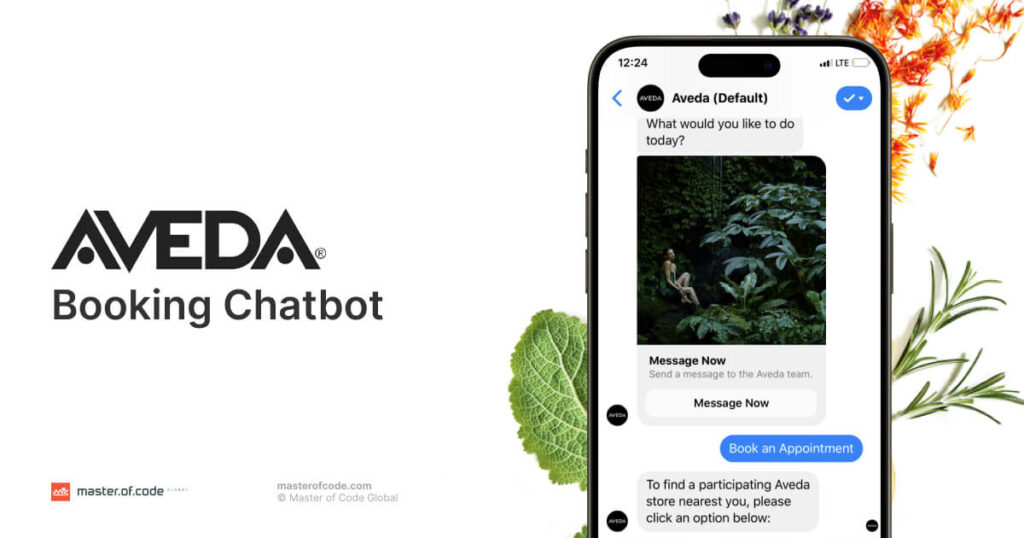
Chatbot Use Cases in Automotive
The AI-powered assistants are transforming how car dealerships and manufacturers interact with clients, providing personalized support and valuable services throughout the car-buying journey and beyond. As an example, you can discover how we created the GenAI Virtual Assistant for a car dealership. This tech innovation helped them engage clients and answer complex questions, showcasing the potential of assistants to tailor interactions and improve efficiency.
Here are some key chatbot use cases in the automotive industry:
- Customer Support: Virtual assistants give instant answers to common questions about vehicle specifications, financing options, and appointments. For complex inquiries, seamless handover to live agents certifies personalized support.
- Contact Car Dealer: Clients can easily connect with dealerships or agents through the bot, with all interactions recorded in the CRM system for improved sales follow-up and unique help.
- GenAI-Powered Responses: Advanced digital capabilities enable bots to understand natural language and provide engaging, informative answers, making interactions feel more human and conversational.
- Find Dealership Near You: Users can quickly locate the nearest agency by entering their postal code or index, facilitating convenient access to local services.
- Test-Drive Booking: Chatbots simplify the trial run process, guiding people through vehicle selection and appointment scheduling for a smooth and hassle-free flow.
Chatbot Use Cases in Travel & Hospitality
The industry is utilizing assistants to elevate experiences and customize interactions. Master of Code Global designed, built, and launched the Luxury Escapes Travel Messenger Chatbot, which allowed users to search for deals, book trips, and play a “Roll the Dice” game to discover destinations. This agent demonstrated the potential of AI to individualize recommendations and boost sales.
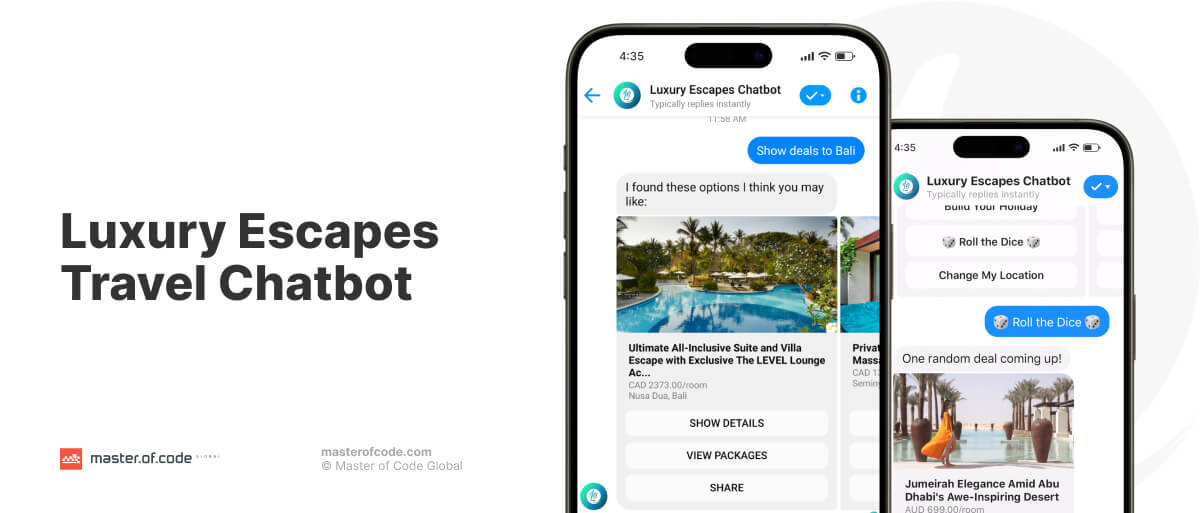
Here are some key chatbot use cases in travel & hospitality:
- Enhancing the Trip Planning Experience: VAs can guide people through the booking process, offer travel deals based on preferences, and even render interactive journeys for destination suggestions.
- Retargeting Users: By analyzing data and behavior, agents can remarket potential customers with relevant travel deals and promotions, resulting in higher conversion rates compared to traditional email campaigns.
- Increasing Engagement: Interactive features like destination suggestion games (“Roll the Dice”) and augmented reality (AR) filters can be integrated into assistants to improve interest and provide unique interactions for travelers.
Chatbot Use Cases in Banking
The AI-powered virtual assistants have become valuable assets, streamlining various aspects of finance and improving interactions between customers and institutions. In this section, we will explore a diverse range of chatbot use cases in banking, demonstrating how these intelligent tools redefine client service, foster financial literacy, and transform the way people manage their money.
- Financial Advice and Insights: Chatbots in banking can provide personalized help to customers based on their transaction history, spending patterns, and money goals. These tools can help users make informed decisions about investments, savings, and budgeting, contributing to better financial management.
- Account Analysis: Banking bots can examine profiles and transactions, offering detailed breakdowns of expenses, income, and savings. This feature helps gain a comprehensive understanding of your clients’ financial health and identify areas where they can optimize their spending.
- Expense Tracking: One of the valuable uses of this digital tool in banking is assisting users in cost monitoring. These chatbots can efficiently help your service consumers to view their spending by categorizing transactions and giving insights into their financial habits. By offering personal budgeting advice and setting financial goals, VAs empower people to make informed decisions and practice responsible budget management. With real-time updates and interactive interfaces, expense tracking assistants promote better financial planning and assure a more secure future.
- Balance Notifications: Banking chat tools are equipped to send alerts and timely bill reminders, allowing users to stay informed about their account status and upcoming payments. Being AI-powered, these bots proactively alert people about low balances, potential overdrafts, and impending bill due dates. This use of agents ensures that your clients have better control over their finances, avoid late payment fees, and maintain a positive financial standing. With these helpful reminders, consumers can stay organized and on track with their financial commitments. Such a caring approach builds an additional layer of customer trust and loyalty.
- Suspicious Activities Alerts: One of the critical chatbot use cases in banking is their ability to detect and alert about questionable actions on accounts. Through continuous monitoring, VAs can identify unusual transactions or login attempts from unfamiliar locations. By promptly notifying people about such suspicious incidents, these assistants play a pivotal role in safeguarding financial information. This proactive security feature instills confidence in users, demonstrating the bank’s commitment to protecting their assets and affirming a safe experience.
Chatbot Use Cases in Telecom
Virtual assistants have modified the way communication service providers interact with customers. They offer a diverse range of applications that streamline support processes and optimize operations. From offering 24/7 support to guiding users through troubleshooting, managing international roaming, and offering personal plan recommendations, chatbots play an important role in shaping the future of the telecom industry. At Master of Code Global, we also have such a project to share. We reduced intent creation and testing effort by 80% with our telecommunication virtual assistant, creating a feature-rich solution that improved client help and drove conversions.
Also, the telecom company collaborated with us to polish their internal digital AI team’s virtual assistant. This partnership involved strategic roadmapping, prioritizing use cases, conversation design services, bot tuning, and Conversational AI consulting. By implementing our conversation design process, we regularly analyzed data and reviewed dialogues to address concerns and improve existing interactions.
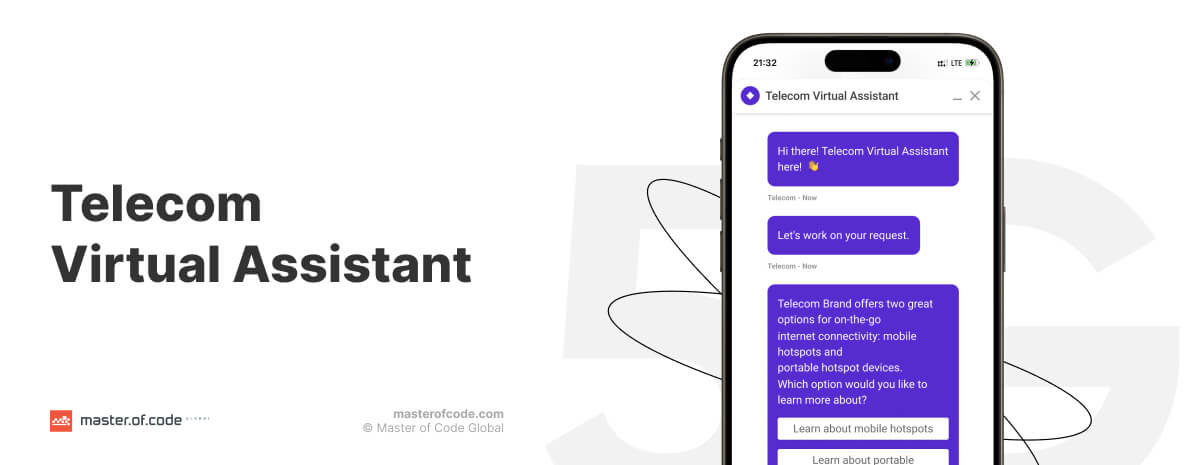
- Customer Support and Assistance: One of the most impactful chatbot use cases in the telecom industry is presenting 24/7 help. Telecom bots are equipped to handle a wide range of inquiries, including billing-related questions, plan details, data usage tracking, and troubleshooting outages. For example, after our in-depth audit GO Malta’s chatbot became even more efficient. Collaborating closely with GO’s team, we developed a detailed plan to improve the chatbot’s conversational effectiveness, robustness, and consistency with GO’s brand identity. By offering round-the-clock support, the assistant guarantees faster response times, allowing people to receive immediate help whenever they need it, even outside of regular business hours.
- Technical Support: These intelligent virtual assistants guide users through the resolution process, offering detailed instructions and interactive approaches to address common problems. By applying their AI capabilities, bots can quickly diagnose issues, offer appropriate fixes, and empower people to resolve problems independently. This use of chatbots in technical support significantly reduces the number of support calls to the telecom company, as consumers can find immediate strategies through the interface.
- Account Management: Digital tools can facilitate profile-related tasks, such as updating contact information, managing payment methods, and checking account balance, boosting self-help options for customers.
- Roaming Assistance: Before and during their trips, clients can use chatbots to receive step-by-step guidance on how to enable roaming services on their devices, confirming uninterrupted communication while away from their home country. Bots can also inform people about charges, data usage rates, and any special offers related to international usage. By providing this information in real-time, digital tools enable clients to make informed decisions about their roaming preferences and avoid unexpected charges.
Chatbot Use Cases in Healthcare
The medical industry opens a range of valuable applications, including personal medication reminders, symptom assessment, appointment scheduling, and health education. The chatbots improve patient engagement, streamline administrative tasks, and contribute to evidence-based clinical decision-making. By giving round-the-clock support, improving medication adherence, and empowering patients to make informed choices, healthcare chatbots are modifying the industry and shaping a more patient-centric approach to medical services.
- Medication Assistance: Healthcare bots can remind patients to take their medicine on time, provide dosage information, and offer personalized schedules. A good example is our Cancer Awareness Chatbot for CSource, which improves user flow and gives seamless access to essential resources and support materials. This demonstrates the potential of agents to assist patients in managing their medications and improving their overall well-being.
- Prescription Summary: Chatbots can help patients with viewing and understanding their recipe details, including dosage instructions, potential side effects, and refill options. This use case helps patients stay informed and actively participate in their treatment plans.
- Find Providers: Healthcare bots can help medical clients find suppliers, clinics, and hospitals in their area. By offering information on specialties, ratings, and availability, VAs support patients in making informed decisions about their healthcare options.
- Drug Discovery: Advanced intelligent solutions assist with pharmaceutical research by analyzing vast amounts of scientific data and literature. By identifying potential drug candidates and their interactions, bots contribute to accelerating medical examination and innovation.
- Predictive Maintenance: In healthcare facilities, such tools can be employed for preventive analytics of medical equipment. By continuously monitoring device performance and generating alerts for potential malfunctions, chatbots help verify the reliability and safety of critical medical devices.
Insurance Chatbot Use Cases
The AI tools offer a wide range of valuable implementations for both providers and customers. Insurance bots can efficiently give policy information, generate quotes, and compare various products to help people make informed decisions.
- Policy Information: In this sector, conversational solutions offer people instant access to regulation overview, including coverage details, premium amounts, and protocol renewal dates. By offering this information, bots streamline the process of policy management and empower customers to stay informed about their insurance coverage.
- Personalized Quotes: Chatbots can gather relevant information from clients and generate insurance citations based on their specific needs and requirements. This use of virtual assistants makes sure that people receive accurate and tailored quotes, enabling them to make well-informed decisions about their insurance options.
- Cross Compare Insurance Products: VAs intelligently compare different products offered by the company or multiple insurers. By presenting clients with side-by-side comparisons of coverage options, prices, and features, bots help users make informed choices and select the insurance plan that best suits their needs and budget.
eCommerce Chatbot Use Cases
The AI-powered virtual assistants offer a diverse range of applications that optimize interactions, boost sales, and streamline operations. From providing product recommendations to handling inquiries and facilitating smooth checkout processes, eCommerce chatbots play an important role in enriching the shopping process and driving success for online companies.
- Automated Order Processing: eCommerce tools can improve order handling and payment procedures, simplifying the checkout process for customers. By reducing friction in the purchasing journey, bots improve the overall shopping experience and reduce cart abandonment rates.
- Feedback Collection: Agents can engage people in post-purchase surveys and reaction gathering. By soliciting reviews on products and user service, chatbots help businesses get valuable insights and identify areas for improvement, ultimately upgrading loyalty.
- Order and Refund: VAs can efficiently process inquiries, track the status of deliveries, and assist people with return requests. For instance, we developed a payment refund chatbot that gathers information about the purchase, any issues encountered, and the payment method to efficiently process refunds and guarantee a positive experience. This solution helped our client save around $10.2M in refund costs.
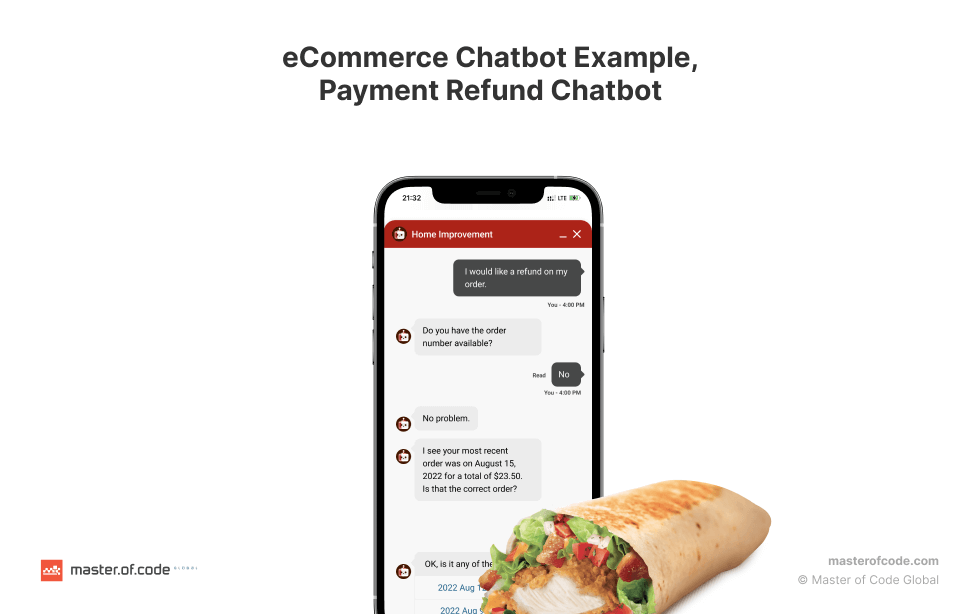
Government Chatbot Use Cases
The citizen support services demonstrate the potential of AI technology to refine interactions with the government, improve public services, and foster a more inclusive and efficient supervising and controlling system.
- Citizen Information and Services: One of the primary chatbot use cases of government virtual assistance is to provide people with instant access to a wide range of information about public assistance, programs, and regulations. These bots answer queries related to taxes, permits, licenses, and other similar offerings. As an example, we created an assistant integrated directly into the City of Winnipeg’s 311 service to facilitate easy access to information about public transport, popular locations, and more.
- Voter Assistance: Government chatbots offer valuable support to citizens during elections. They help with voter registration, give information on polling locations, and offer election-related details. Additionally, bots can contribute information about candidates running for office and election dates, encouraging voter engagement and increasing overall participation in the democratic process.
- Public Feedback and Surveys: One of the most popular government AI chatbot use cases is the collection of public feedback and opinions on new policies and community issues. Furthermore, assistants can play a crucial role in certifying the quality and safety of these online interactions. As a bright example, our UA Anti-Spam Bot moderates content and protects users by blocking harmful messages, including spam, hate speech, and explicit content on Telegram. Currently, 72% of chats use blockage of fraudulent messages, and 1.4M users moderate their online communities with our tool.
- Benefits and Social Services: One more use case for agents in government is guiding citizens through the process of applying for social advantages. These chatbots offer essential information on eligibility criteria, required documents, and application status. By simplifying the query resolution process, VAs assure that citizens can access social services efficiently and receive the help they need. This use case improves accessibility to government assistance programs, reduces bureaucratic barriers, and improves the effectiveness of social delivery.
Chatbot Use Cases in Education
The following scenarios demonstrate the transformative role of AI technology in the education sector, fostering personalized learning, improving student support, and revolutionizing the way learners engage with educational institutions and content. Statista reports that approximately 92% of students globally express interest in receiving tailored aid and information regarding their degree progress.
- Personalized Learning: Education AI chatbot use cases demonstrate how to revolutionize the teaching process by employing algorithms to assess students’ strengths, weaknesses, and preferences. Through this data-driven approach, bots can deliver tailor-made study materials, exercises, and resources that cater to each student’s unique learning style, facilitating self-paced education and fostering a deeper understanding of the subject matter. By providing customized feedback and adaptive pathways, students can use digital tools to take control of their progress, making learning more engaging, effective, and enjoyable.
- Enrollment Assistance: Education chatbots offer valuable help to prospective students during the admission process. Conversational tools give essential information on available courses and enrollment procedures. They impact the onboarding experience by guiding students through each step of the application, validating all necessary documents that are submitted, and offering assistance for any inquiries. This directly contributes to higher enrollment rates for educational institutions.
- Language Learning: Bots can engage learners in interactive language exercises, conversation practice, and vocabulary building, bettering their understanding of the language and supporting acquisition, as well as fluency development.
Final Thoughts
The proven AI chatbot use cases we have explored demonstrate the significant impact these tools can have on organizations across industries. From improving customer help to optimizing sales and accelerating various processes, VAs have shown their ability to deliver efficient and personalized results. However, their potential doesn’t end here. As technology continues to evolve and businesses recognize the value of digital tools, their popularity is predicted to rise even further.
By 2027, approximately 25% of organizations will have AI as their main client service channel. With their increasing adoption and advancements in technologies, chatbots are poised to play an even more critical role in shaping the future of engagement. Embracing virtual assistants today means staying ahead of the curve and unlocking new opportunities for growth and success in the ever-evolving digital landscape. Partner with Master of Code Global to create intelligent chatbots tailored to your business needs. Let’s revolutionize how you connect with your customers—get in touch today!




